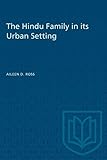The Hindu Family in its Urban Setting / Aileen D. Ross.
Material type: TextSeries: HeritagePublisher: Toronto : University of Toronto Press, [1961]Copyright date: ©1961Description: 1 online resource (340 p.)Content type:
TextSeries: HeritagePublisher: Toronto : University of Toronto Press, [1961]Copyright date: ©1961Description: 1 online resource (340 p.)Content type: - 9781487573218
- 9781487584566
- 301.420954
- online - DeGruyter
| Item type | Current library | Call number | URL | Status | Notes | Barcode | |
|---|---|---|---|---|---|---|---|
 eBook
eBook
|
Biblioteca "Angelicum" Pont. Univ. S.Tommaso d'Aquino Nuvola online | online - DeGruyter (Browse shelf(Opens below)) | Online access | Not for loan (Accesso limitato) | Accesso per gli utenti autorizzati / Access for authorized users | (dgr)9781487584566 |
restricted access online access with authorization star
http://purl.org/coar/access_right/c_16ec
THE POPULATION of India is made up of an infinite variety of castes, religions, and language groups, which have lived side by side, in an intricate division of labour, for thousands of years. Many customs, and much of the social structure, historically isolated from modern technological and industrial developments, have remained essentially the same. Such deeply laid patterns of behaviour do not respond easily to change. This study analyses one of the Hindu structures-the family-which is considered by sociologists to be very resistant to change. Its purpose is to show the effect of industrial and technological change on the traditional middle- and upper-class urban Hindu family. In doing so, it will attempt to develop a sounder theoretical framework within which the many dimensions of family change can be studied. Up to the present, apart from a few novels and sociological studies of urban life, it has been the traditional rural joint family which has occupied the attention of students and writers. However, it is the middle- and upper-class urban families which are facing the full impact of the rapidly changing conditions which have accompanied India's growing industrialization.
Mode of access: Internet via World Wide Web.
In English.
Description based on online resource; title from PDF title page (publisher's Web site, viewed 01. Nov 2023)


